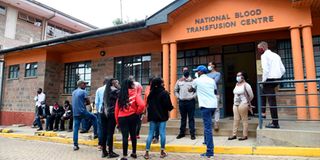Report reveals shocking details of blood transfusion centres

People waiting to donate blood for their family members and friends at the National Blood Transfusion Centre at Kenyatta National Hospital in Nairobi on May 11,2020.
The digital blood management system is down because software licences have not been paid for. This has compromised the quality of donated blood transmitted to those in need, a report by a parliamentary committee reveals.
The report by the National Assembly’s Committee on Health also shows that only two cold rooms for blood storage are operational while the rest have broken down.
The report, tabled in Parliament on Thursday by committee vice-chair Joshua Kutuny, also revealed that the Kenya National Blood Transfusion Service (KNBTS) is operating with only 25 per cent of its staffing needs, with only 144 workers against the required 600.
Satellite centres
“Kenya Blood Transfusion Service as currently constituted is in a dire state which includes all its regional blood transfusion centres and its satellite centres,” the report says.
“The centres are in a dilapidated state, lacking enough personnel, operational support, transport, reagents and other materials. Donors withdrew their support.”
The committee, while receiving citizens’ views on the Kenya National Blood Transfusion Service Bill, 2020, also found that KNBTS, with 33 sites across the country, has only 10 motor vehicles, a majority of which are grounded because there is no money to service them.
Kenya requires at least 500,000 units of blood annually, the committee found, but due to bureaucratic delays and inefficiencies in KNBTS, only 93,000 units were collected last year.
In moving the bill for its second reading on Thursday, Mr Kutuny said lawmakers need to pass it urgently to streamline blood donation.
Most MPs, who supported the bill, said it was time for proper regulations on handling blood, saying it is an essential and precious commodity.
Kilifi North MP Owen Baya said the bill will set up structures to ensure that donated blood is safe.
Save lives
“The cost of blood will go down and this will save more lives as poor people will now be able to afford blood,” he said.
Under the bill, owners of health facilities face a fine of Sh1 million or three years in prison if they sell blood without the Health Cabinet secretary’s clearance.
The bill prohibits imports or exports of blood without the express permission of the Cabinet secretary.
The proposed legislation also seeks to cure loopholes that have turned blood donations into a lucrative business targeting rich patients as the majority poor die for lack of blood.
If approved, the bill sponsored by Murang’a Woman Representative Sabina Chege, will provide a legal framework for activities relating to blood donation, testing, processing, safeguarding, transfusion and quality control.
Kenya lacks a legislative framework governing blood transfusion services and this compromises the safety, quality and availability of blood.





